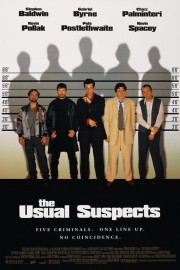The Usual Suspects
When “The Usual Suspects” came out in 1995, there were two trains of thought about it: 1) that it was a film noir worthy of discussion with the classics of the ’40s and ’50s; and 2) that it was a shaggy dog movie based on a twist that negated the entire thing. Of course, there are definitely different degrees of how these ways of thinking are considered by people, especially considering the masterful performances by this fantastic cast, but in the end, it comes down to Christopher McQuarrie’s Oscar-winning screenplay, and Bryan Singer’s direction of said script. By the way, I’m in the first category.
Even though it was simply an indie-level success for Singer in 1995 at the box-office, it’s become enough of a pop-culture talking point over the past 19 years that explaining the plot of McQuarrie’s pretzel of a screenplay is unnecessary. In essence, the film is about a shell game put on by criminals against the police, letting them know that these guys will get away with anything. Of course, it’s a touch more complicated than that, an elaborate scheme by Keyser Soze, an all-powerful crime lord, to get rid of a witness against him by putting five career criminals together for a job as payback for past transgressions against him. Who is Keyser Soze? Only one of the criminals knows for sure, even though– Spoiler Alert –he’s the one who seems least certain when the name first comes up.
The film is told in flashback by Verbal Kint, a gimp known for cons played by Kevin Spacey, who won the first of his two Oscars for his sly, sensational performance. Kint is recalling the events that led up to a bloodbath at a harbor where the rest of his cohorts– Dean Keaton (Gabriel Byrne), Todd Hockney (Kevin Pollack), and Michael McManus (Stephen Baldwin), with another one, Fred Fenster (Benicio Del Toro), killed by trying to run from Soze before the job –are dead. He’s talking to a Customs Agent from New York (Dave Kujan, played by Chazz Palminteri) before his bail is posted, and after getting a sweet deal from the DA for his testimony that includes absolute immunity. As Kujan finds out, though, there’s more to Verbal’s story than just what he told the DA. And when Soze’s name comes up, Verbal isn’t happy, and once we hear him talk about it, it’s not hard to figure why.
You would think that, once you’ve watched this film, and know it’s secrets, that it would fall apart, lose it’s appeal, and lack rewatch power. For some, it probably did, but for me, not even close. Singer and McQuarrie pull the greatest trick a filmmaker can do, and make the twist so compelling that not only do we watch the film again to see if we can figure out the film’s logic, but also allow the film to enter the pop culture lexicon. Though it was compared (mostly favorably) to “Pulp Fiction” when it came out, “The Usual Suspects” has become something of a milestone of modern crime cinema (or, at least, of “twist ending” cinema) itself, which is a terrific compliment to what Singer and McQuarrie (who had previously collaborated on the indie film, “Public Access,” which marked both men’s feature debut) accomplished here. In the intervening 19 years, director and writer have gone their own ways many times (Singer with the “X-Men” franchise and “Superman Returns”; McQuarrie with “Way of the Gun” and “Jack Reacher”), but they’ve reunited at times on projects like “Valkyrie” and “Jack the Giant Slayer,” and their work together is always smart and engaging, even if it hasn’t quite reached the heights of “The Usual Suspects” (which also introduced film fans to John Ottman, Singer’s brilliant composer-editor collaborator, who did great work on this film).
In the end, it comes down to the cast Singer collected here. Populating the cast with character actors rather than big stars was a stroke of genius that pays off immediately, starting off with the police lineup where we meet each of the major players. It’s an ingenious piece of writing on McQuarrie’s part that establishes each character’s personality while also being a combination of smart crime drama writing mixed with a bit of stand-up comedy attitude that each person (Pollack, Baldwin, and Del Toro, in particular) plays to with wicked glee. Each actor brings a different personality to the table, and with the chemistry between them, it makes for a dynamic movie watching experience. Spacey made the biggest impact, to be sure, but there’s not a slouch in the cast, with Byrne’s weathered looks and weary voice perfect as Keaton, who’s trying to go straight; Baldwin and Del Toro making a unique tag team as the members of the team who have worked together longest; and Pollack as a smart ass who will go along with any plan, all the while making snide comments about his cohorts. Of course, the ending calls into question the series of events involving these five characters, which is part of detractor’s problems with the movie, but if the movie is to succeed on multiple viewings, the cast has to work together, and on that level, the film is a genuine triumph, regardless of how much we believe of the story when it’s all said and done, and the devil pulls off his great disappearing act, which I can watch over and over, and never get tired of.










